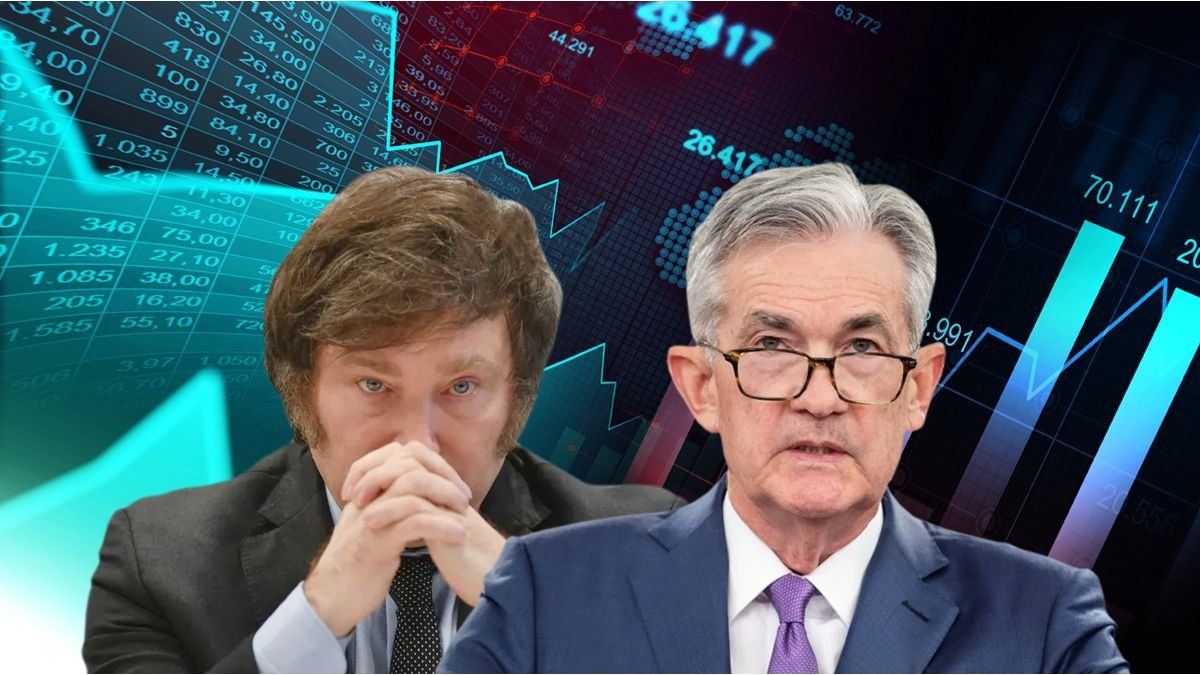In recent days the general climate has changed after the fear unleashed last week with the disarmament of carry trade global with epicenter in Tokyo, hand in hand with good economic data in the US and the The Fed is expected to cut interest rates in SeptemberThe local market thus benefited from the international boost and Argentine assets performed accordingly, although with mixed weekly closings.
The truth is that confidence returned to the stock markets after US retail sales data that surprised to the upside and weekly unemployment claims data that improved. Therefore, Investors are taking risks again and are unwinding some of their defensive positions, particularly punishing longer-term bonds and sectors such as real estate and utilities. Now all attention will shift to the close of next week when the world’s top central bankers meet for the traditional meeting of Jackson Holewhere Fed chief Jerome Powell will speak.
And speaking of the US, President Milei better start recalculating his foreign policy strategy because if the bets turn out to be correct, it is now Kamala Harris who is running ahead of the Republican candidate.: According to RealClearPolitics, based on the average of six betting markets, Donald Trump has a 45% chance of prevailing in the November presidential election, while Harris has a 53%. The improvement, according to the people at Raymond James, is due to strong fundraising by the Democratic team and an effective transition between the Biden and Harris campaigns.
While at the local level the dialogues between operators, managers and analysts, where the Chinese walls typical of the compliance of the 90s, they refine the avalanche of fireworks typical of the New Year’s celebration or the winning of a championship, by the hand of the Alberto-gate with all its aspects, the presidential emergence of “Yuyito”, the struggle for the intelligence services area, and the whole festival of videos, photos and chat. What is heard among the money-grubbing people?
Plucking the daisy from the trap
The debate continues on the risk of freeing the exchange market and the risk of not doing so. Although President Milei dismisses the need to devalue, the market still has the impression that lifting the currency controls will require a jump in the official dollar.
In a packed Zoom meeting, the hosts, close to the libertarian government, considered that it should be done before the end of the year to be in good shape for the midterm elections, without so much exchange rate delay. This deadline is linked to the debt maturities of January 2025, which are key to getting out of the currency controls. A renowned economist summarized the dilemma between accelerating inflation and accumulating reserves.
There arose the question, from the hand of two expert analysts, about what the critical level of reserves would be. There are several estimates, but the truth is that the candles lit for money laundering, the moratorium and Personal Property and something from the RIGI are determining factors for what is to come in terms of exchange. Will the REPO financing tanks of General “Alais” Caputo arrive? They would also help, and a lot.
And speaking of exchange rate lag, several men and women in the market have already noticed the growing and early interest in knowing how rents were on the neighboring shore, because they discounted that this summer, in dollars, it will be cheaper to vacation in Punta del Este, even in Brazil. In another order, the confusion around monetary policy remains al dente, especially every time the President or some member of the economic team speaks about it. In addition, the Riojan default, which is due for summary judgment in New York, does not help at all. The last Treasury bill auction reflected that the Ministry of Finance is still interested in continuing to extend the average life of the debt (more than 10 years). duration).
Politics were also discussed during the Zoom meeting, which made it clear that the government has not yet undertaken any political training in management, which is already vilified by both insiders and outsiders.
The man who was in charge of analyzing the political panorama warned the virtual audience that Milei’s voters now aspired to “make ends meet,” which shows the social tension that is still on the surface. In this regard, another colleague pointed out that the problem was that Milei was acting as a candidate, not as a president, because that would still pay off as a confrontation strategy for someone who does not have parliamentary majorities or governors. But the polarization of society, added to the high level of poverty, was a wound that no one knows how much more salt it will endure.
At another meeting, in Puerto Madero, a highly sought-after political scientist asserted that polls, surveys and focus groups They are not yet defining whether the libertarian experiment was a transition towards change or whether it was a change of system that surpassed the figure of Milei.
By the way, the market’s interpretation of the artist “Yuyito”‘s appearance on the scene is that the Government is pursuing the goal of showing the President as increasingly human, as an ordinary person, further removed from the schizophrenic media character he was known as years ago.
How do you see it outside?
In a conference call The British government mentioned that, for the first time in the Milei era, the July CPI ended up being higher than the expectations of the last REM of the BCRA. In this regard, they highlighted that the July CPI resumed the downward trend thanks to the fact that the Government stopped the cuts to energy subsidies and the increases in fuel taxes. They acknowledged that inflation rates began to slow down more than they had previously expected but believed that it was unlikely to reach the official target of 2% per month.
At another financial meeting, this time at one of the largest Brazilian banks, the appreciation of the real exchange rate was discussed as the main challenge for Argentine economic policy. They considered that the economic policy implemented by Milei was a shock therapy where most of the measures are harsh, with a considerable recessionary impact in the short term but which have led to a notable improvement in fiscal accounts, which for now is the main anchor of economic policy.
For these analysts, inflation also fell, but due to the maintenance of an overvalued official exchange rate since before the elections, which has made it difficult to accumulate reserves, a necessary condition for the government to be able to fulfill one of its main promises of eliminating capital controls.
They concluded that the expectation that a significant devaluation of the exchange rate will be necessary in the future even contributes to putting a floor on inflation expectations and represents a major obstacle to economic stabilization. They also analyzed the issue of money laundering, with its objective of increasing reserves via the reserve requirements of dollar deposits, and the expert in these matters recalled that the agreement between the AFIP and the FATCA that would open financial secrecy is in effect. In that meeting, the statements of
Joyce Chang, Managing Director and Chair of Global Research at JP Morgan, said the further cooling of the US CPI in July, the easing of labour market tightness and the slowdown in wage inflation pave the way for the Fed to cut in September. The only question remaining is whether it will start with a 50-point or 25-point cut, which will depend on how big the rebound in payrolls is in August. She said her economists expect the Fed to accelerate rate normalization, offering about 100 points of easing by the end of the year, with further cuts of 50 points anticipated in September and another 50 points in November. Looking at last week’s market sell-off, JPM estimates that about 70% of speculative yen trades have been unwound.
Yet they did not see the start of a late-cycle wave. One manager provided the insight that, despite everything, the American venture capital firm Andreessen Horowitz, based in California, is about to land in Asia with its first office in Japan to recruit Japanese companies that want to invest in start-ups. He explained that Silicon Valley venture capital firms are increasingly turning to Japan as an alternative to Chinese investors amid rising tensions in the high-tech sector between the US and China.
Aafter to change figurines
In an acquaintance roof garden An After Office served to update the agenda of transfers and movements. On the one hand, the financial company Inviu made official the appointment of the new CEO, José Miguens, a former McKinsey employee. The appointment of Javier Marcus as the new Business Director of Consultatio was also made official (after the purchase of the TPCG group by the investment group led by Eduardo Costantini), who was born in Rofex and consolidated himself in Southern Trust integrating Sigrid Tolaba’s team. While on the international level, the most talked about thing was the incorporation of the former Goldman Sachs employee, Ayesha Parra, to Russell Investments to lead the alternative platform’s strategy at a global level from the New York headquarters. On the other hand, the Chilean -ex BICE and ex BTG Pactual-, Diego Guzmán, moved to Compass as co-portfolio manager. Meanwhile, BlackRock Brazil director Paula Salamonde, formerly of MSCI, left the North American asset manager to head the Investor Relations department of Rio-based asset manager Icatu Vanguarda. Another heavy transfer was that of Annerien Hurter, from Citi to Ocorian (formerly of HSBC, JP Morgan and UBS).
Source: Ambito
I am a 24-year-old writer and journalist who has been working in the news industry for the past two years. I write primarily about market news, so if you’re looking for insights into what’s going on in the stock market or economic indicators, you’ve come to the right place. I also dabble in writing articles on lifestyle trends and pop culture news.




